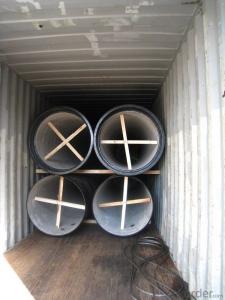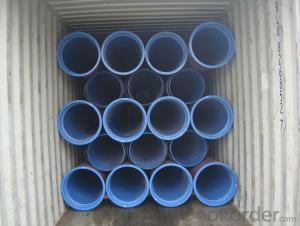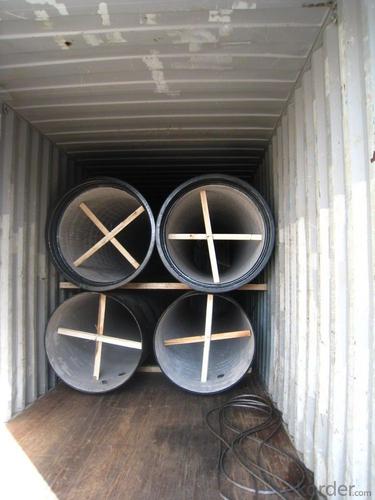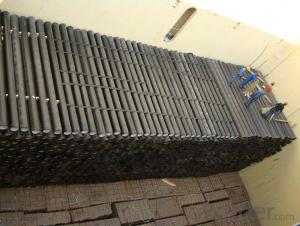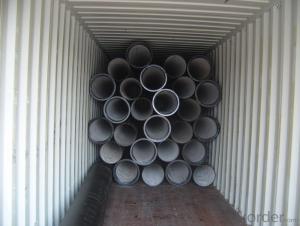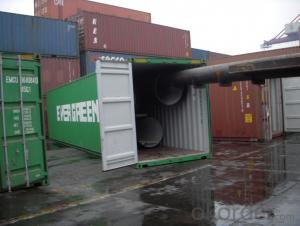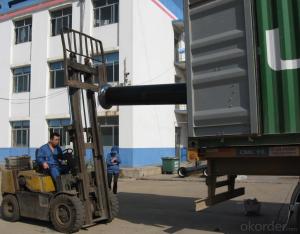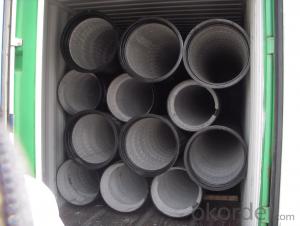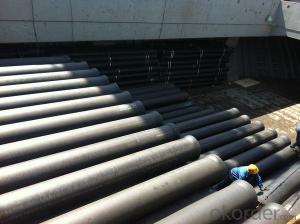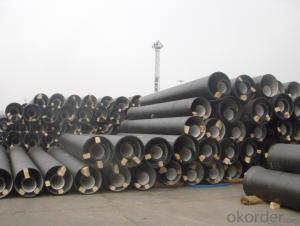DUCTILE IRON PIPE AND PIPE FITTINGS C CLASS DN200
- Loading Port:
- Tianjin
- Payment Terms:
- TT OR LC
- Min Order Qty:
- 23 pc
- Supply Capability:
- 3000 pc/month
OKorder Service Pledge
OKorder Financial Service
You Might Also Like
· Material : Ductile Cast Iron
· Size Range : DN 80mm to DN 2000mm
· Unit Effective Length : 6m or 5.7m
· Manufacture Standard: ISO 2531:1998/ EN 545:2006/EN 598:2007
· Annual capacity : 200,000 tons
· Coating Exterior: Zinc 130g/m2 according to ISO 8179-1 and bitumen coating 70 microns.
· Cement Interior: Portland Cement/ High Alumina Cement/ Sulphate Resisting Cement Lining according to ISO 4179
· Special requirements on external coating and internal lining can be applied
· We also provide accessories such as SBR/EPDM rubber gaskets, lubricant paste, pipe caps, PE sleeves, etc.
Additional Parts:
Each pipe is strictly inspected according to related standard to ensure permanently high performance.
Easy Installation at site and service free for life
Long Service Lifespan
Quotation will arrive you within 24hours once we get your inquiry.
We guarantee offering you a competitive price.
A copy of original inspection reports of pipes will be offered after shipment.
Photos of loading process will be sent to the customer after shipment effect.
We will follow-up the delivery progress after shipment effect and update to the customer on weekly basis.
- Q: Are ductile iron pipes suitable for high-temperature applications?
- No, ductile iron pipes are not typically suitable for high-temperature applications as they have a lower melting point compared to other materials like steel.
- Q: Are ductile iron pipes suitable for power plant cooling systems?
- Ductile iron pipes are well-suited for power plant cooling systems, offering numerous advantages that render them perfect for such applications. Firstly, their high strength and durability enable them to withstand the immense pressure and heavy loads typically associated with power plant cooling systems. Additionally, these pipes exhibit excellent resistance to corrosion, a vital feature in an environment where water and other cooling fluids continuously flow. Moreover, they boast good thermal conductivity, ensuring efficient heat transfer away from power plant equipment and contributing to the overall cooling process. Lastly, ductile iron pipes are cost-effective compared to other commonly used materials in power plant cooling systems, making them a practical choice. Ultimately, due to their strength, corrosion resistance, thermal conductivity, and cost-effectiveness, ductile iron pipes represent a reliable and suitable option for power plant cooling systems.
- Q: How do ductile iron pipes handle water hammer in high-rise buildings?
- Ductile iron pipes are known for their durability and strength, making them an excellent choice for handling water hammer in high-rise buildings. Water hammer is a common phenomenon that occurs when the flow of water in a pipe is suddenly stopped or changed direction, resulting in a pressure surge. This can cause significant stress on the pipes and potentially lead to damage or failure. Ductile iron pipes are designed to withstand high-pressure situations, making them highly resistant to water hammer. They have a high tensile strength and can handle the sudden changes in pressure without deforming or fracturing. This is particularly important in high-rise buildings where the water supply needs to be delivered to various floors with different pressures. Moreover, ductile iron pipes have excellent corrosion resistance properties, which further enhances their ability to handle water hammer. Corrosion can weaken pipes over time and make them more susceptible to failure during pressure surges. However, the corrosion resistance of ductile iron pipes ensures that they remain structurally sound even in high-pressure situations. Additionally, the flexibility of ductile iron pipes allows them to absorb and dissipate the energy generated by water hammer. This helps to minimize the impact on the overall system and reduce the potential for damage. The ability to absorb energy also helps to reduce noise and vibrations associated with water hammer, creating a more comfortable and efficient water supply system. In conclusion, ductile iron pipes are well-equipped to handle water hammer in high-rise buildings. Their strength, corrosion resistance, and flexibility make them a reliable choice for delivering water under varying pressures without compromising the integrity of the system.
- Q: The difference between cast iron pipe and ductile iron pipe
- Ductile iron is based on the cast iron to change some of the characteristics of the structure of iron, so that it has become a lot of toughness, than the cast iron pipe is too brittle shortcomings much better, the tensile strength of the pipe bending strength greatly improved. The sealing material used in the socket interface is rubber ring.
- Q: What are the advantages of using ductile iron pipe over concrete pipe?
- There are several advantages of using ductile iron pipe over concrete pipe. Firstly, ductile iron pipe has a higher strength-to-weight ratio compared to concrete pipe. This means that it can withstand higher pressure and loads while being lighter in weight. This makes it easier to handle and install, reducing labor costs and time. Secondly, ductile iron pipe has superior corrosion resistance compared to concrete pipe. It is less likely to rust or degrade over time, which increases its lifespan and decreases the need for frequent repairs or replacements. This makes it a more cost-effective option in the long run. Additionally, ductile iron pipe has better flexibility and resilience compared to concrete pipe. It can withstand ground movement, settling, and other environmental factors without cracking or breaking. This makes it more durable and less prone to damage, reducing maintenance and repair costs. Moreover, ductile iron pipe has a smoother interior surface compared to concrete pipe. This results in improved flow characteristics and reduced friction, allowing for more efficient transportation of fluids. It also minimizes the risk of clogs or blockages, ensuring uninterrupted flow. Furthermore, ductile iron pipe is highly versatile and can be used in a wide range of applications. It is suitable for both above-ground and underground installations, making it ideal for various infrastructure projects such as water supply systems, wastewater treatment plants, and industrial applications. Overall, the advantages of using ductile iron pipe over concrete pipe include its higher strength-to-weight ratio, superior corrosion resistance, better flexibility and resilience, smoother interior surface, and versatility. These benefits make it a reliable and cost-effective choice for various infrastructure projects.
- Q: Can ductile iron pipe be used for gas distribution systems?
- Indeed, gas distribution systems can utilize ductile iron pipe. Ductile iron, being a robust and enduring substance, exhibits resistance to corrosion, thus rendering it suitable for subterranean applications. Its capacity to endure high pressure and furnish a dependable and enduring solution has led to its widespread employment in gas distribution systems for numerous years. Moreover, ductile iron pipes are acknowledged for their pliability, facilitating simpler installation and upkeep. Nevertheless, it is imperative to guarantee conformity with the specific requirements and standards of gas distribution systems when implementing ductile iron pipes to ensure the system's safety and efficiency.
- Q: Can ductile iron pipes be used in contaminated groundwater systems?
- Contaminated groundwater systems can indeed utilize ductile iron pipes. Renowned for their strength and durability, ductile iron pipes are versatile and applicable in various settings, including water and wastewater systems. These pipes possess corrosion-resistant properties that safeguard against both internal and external corrosion, thus ensuring reliable water transportation, even in the presence of contaminated groundwater. When addressing contaminated groundwater, it becomes imperative to assess the extent and nature of the contamination. Ductile iron pipes exhibit resistance to numerous common chemicals typically found in groundwater, including specific acids and alkalis. However, in instances of severe or specific chemical contamination, it may be necessary to explore alternative pipe materials that offer superior resistance to those particular substances. Moreover, the proper installation and maintenance of ductile iron pipes are vital for their long-term performance within contaminated groundwater systems. Regular inspections, cleaning, and the use of suitable protective coatings can effectively mitigate any potential risks associated with contamination. In conclusion, ductile iron pipes can be effectively employed in contaminated groundwater systems, provided that the level and type of contamination fall within acceptable limits and appropriate installation and maintenance practices are observed. It is always advisable to seek guidance from experts and consider local regulations and guidelines when determining the suitability of pipe materials in specific groundwater systems.
- Q: Can ductile iron pipes be used for cooling water systems?
- Yes, ductile iron pipes can be used for cooling water systems. Ductile iron pipes have excellent corrosion resistance and high-pressure capacity, making them suitable for conveying cooling water. Additionally, their strength and durability ensure long-term performance and stability in cooling water applications.
- Q: How are ductile iron pipes different from cast iron pipes?
- Ductile iron pipes are different from cast iron pipes in terms of their composition and properties. Ductile iron pipes are made from a type of cast iron that has been treated with magnesium to improve its strength and flexibility. This makes ductile iron pipes more durable, impact-resistant, and less prone to cracking or breaking compared to traditional cast iron pipes. Additionally, ductile iron pipes have a higher tensile strength, allowing them to withstand higher internal and external pressures. In summary, ductile iron pipes are a more modern and advanced version of cast iron pipes, offering improved performance and longevity.
- Q: Are ductile iron pipes resistant to UV radiation?
- Ductile iron pipes do not possess resistance against UV radiation. The exposure to UV radiation can lead to the deterioration and weakening of the material as time goes by. In order to safeguard ductile iron pipes from UV radiation, they must be covered or enveloped with a UV-resistant substance or coated with an appropriate protective layer. Furthermore, it is essential to conduct regular inspections and maintain the pipes adequately to identify and rectify any indications of UV damage.
Send your message to us
DUCTILE IRON PIPE AND PIPE FITTINGS C CLASS DN200
- Loading Port:
- Tianjin
- Payment Terms:
- TT OR LC
- Min Order Qty:
- 23 pc
- Supply Capability:
- 3000 pc/month
OKorder Service Pledge
OKorder Financial Service
Similar products
Hot products
Hot Searches
Related keywords
